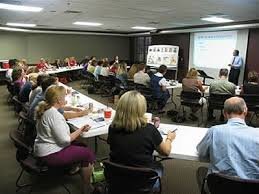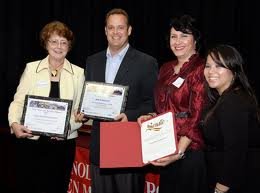K-12 Professional Development
In response to Sonia Gerig of Oakdale, N.Y., remarks testifying to the poor job that teacher prep programs do in training new educators. “I’m at the tail end of my fourth year of teaching high school and have come to realize that many of the classes that I sat through, and paid exorbitant amounts of money for, have had very little application in the classroom,” i.pel promotes quality K-12 teacher development designed to enhance student achievement through the use of classroom technology, common core objectives and entertainment supplemented education.
and have come to realize that many of the classes that I sat through, and paid exorbitant amounts of money for, have had very little application in the classroom,” i.pel promotes quality K-12 teacher development designed to enhance student achievement through the use of classroom technology, common core objectives and entertainment supplemented education.
Teachers and Technology
The ways in which teachers are taught to use technology is outdated because the primary focus of training is on computer literacy, rather than the deeper, more essential understanding and mastery of technology for information processing, communication, and problem solving (see K-12 Teacher Training – Teacher Training in the Use of Supplements).
(The following is an abstract from “Games for a Digital Age”)
Teacher support goes a long way toward determining the long-term success of any supplement in the classroom. However, according to Victoria Van Voorhis, CEO of Second Avenue Learning, “Teachers can also be a big barrier. They are not familiar with gaming and are unclear about how to use games and supplements in the curriculum—are they for independent practice, group work, or integrated learning?” Professional development to familiarize teachers with supplements and games is essential for ensuring that they can successfully integrate learning supplements into their classrooms.
Teachers themselves include among their top four priorities for further professional development “using technology in the classroom.” As more teachers are becoming supportive of using supplements and games in the classroom, initial as well as ongoing professional development support will likely be paired with the purchase of new digital curriculum products such as interactive tools or learning games. In a recent survey sponsored by the Joan Ganz Cooney Center majority of teachers first learn about using digital games in the classroom from in-service professional development workshops (46%), followed by self-directed study (35%).
In 2012, Congress appropriated $3.1 billion for teacher programs that are designed to improve the quality of teachers in the K-12 classroom. These funds account for 4.5% of the total discretionary budget of the U.S. Department of Education. The programs include monies to support professional development in technology integration. The funds are distributed by the U.S. Department of Education to states and local education agencies, and in some cases they are distributed directly to individual teachers.
Using research from state standards i.pel teacher development programs will assist students in “crossing the digital-divide” so every student will be technologically literate before the eighth grade. By improving student development through the use of online and distance learning i.pel will provide programs that help schools meet the goals of Title IID. These programs will enhance the involvement among students, parents, teacher and administrators through the use of technology.
I.pel teacher development courses will be designed to augment state’s Multiple Subject Teaching Credentials. The subjects taught in each K-12 grade level will be related to how technology can enhance these courses. Included in these courses will be how to access student technology literacy and how to technologically differentiate the K-12 classroom. All course content will be aligned with national professional standards and California content and performance standards. i.pel teacher development programs will be given in one to three day seminars. Seminar topics will include:
Technology in the Classroom
- Technology BasicsOvercoming the Generational Technological Bias
- Technology and the Multiple Subject Teaching Credentials
- Assessing Student Technology Literacy
- Technology and the Hierarchy of K-12 Teaching
- Using the teacher/student interactive PowerPoint
- The Use of Digital Media in the Classroom
- Technology and Academic Instruction
- Technology and Technology/Trade Instruction
- Technology is not an end in Education
- The Evolving Nature of Technology
- Finding Quality Material to Support Technology Education

- Cognition & Technology
- Technology & Classroom Differentiation
- Using Technology based Assessments to Guide Instruction
Common Core in the Classroom
- The Common Core Difference
- Common Core Project-Based (team) Instruction
- Common Core Curriculum Design
- Common Core Lesson Planning
Entertainment Education in Curriculum
- The Use of Entertainment Based Education in the Classroom
- Digital Storytelling in the Classroom
Professional development to familiarize teachers with supplements and games is essential for ensuring that they can successfully integrate learning supplements into their classrooms. With the advent of educational elements in K-12 curriculum teachers must be prepared to effective use developed programs in the modern classroom. i.pel prepares teachers for incorporating entertainment elements by seamless developing entertainment based curriculum such as video games, episodic elements, documentaries and graphic literature into the classroom and guides them as to which games are educational and which aren’t.
Also See: Teacher Development

Recent Comments